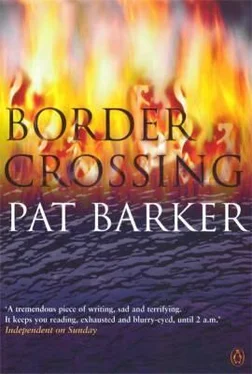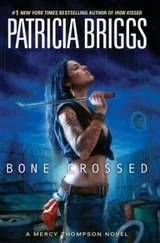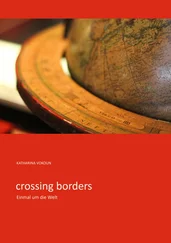Pat Barker
Border Crossing
Pat Barker was born in Thornaby-on-Tees in 1943. She was educated at the London School of Economics and has been a teacher of history and politics. Her books include Union Street, winner of the 1983 Fawcett Prize, which has been filmed as Stanley and Iris, Blow Your House Down, Liza’s England, formerly The Century’s Daughter, and the following published by Penguin: The Man Who Wasn’t There; the highly acclaimed Regeneration trilogy, comprising Regeneration, The Eye in the Door, winner of the 1993 Guardian Fiction Prize, and The Ghost Road, winner of the 1995 Booker Prize for Fiction; Another World; and Border Crossing.
Pat Barker is married and lives in Durham.
They were walking along the river path, away from the city, and as far as they knew they were alone.
They’d woken that morning to a curious stillness. Clouds sagged over the river, and there was mist like a sweat over the mud flats. The river had shrunk to its central channel, and seagulls skimmed low over the water. The colour was bleached out of houses and gardens and the clothes of the few passers-by.
They’d spent the morning indoors, picking away at their intractable problems, but then, just before lunch, Lauren had announced that she had to get out. They might have done better to drive to the coast, but instead they donned raincoats and boots and set off to walk along the river path.
They lived on the edge of what had once been a thriving area of docks, quays and warehouses, now derelict and awaiting demolition. Squatters had moved into some of the buildings. Others had suffered accidental or convenient fires, and were surrounded by barbed-wire fences, with pictures of Alsatians and notices saying danger, keep out.
Tom kept his eyes down, hearing Lauren’s voice go on and on, as soft and insistent as the tides that, slapping against crumbling stone and rotting wood, worked bits of Newcastle loose. Keep talking, he said to clients who came to him for help in saving their marriages, or — rather more often — for permission to give up on them altogether. Now, faced with the breakdown of his own, he thought, Shut up, Lauren. Please, please, please shut up.
Bits of blue plastic, half-bricks, a seagull’s torn-off wing. Tom’s gaze was restricted to a few feet of pocked and pitted ground into which his feet intruded rhythmically. All other boundaries were gone. Though he did not raise his head to search for them, he was aware of their absence: the bridge, the opposite bank, the warehouses with the peeled and blistered names of those who had once owned them. All gone.
A gull, bigger and darker than the rest, flew over, and he raised his eyes to follow it. Perhaps this focus on the bird’s flight explained why, in later years, when he looked back on that day, he remembered what he couldn’t possibly have seen: a gull’s eye view of the path. A man and a woman struggling along; the man striding ahead, eager to escape, hands thrust deep into the pockets of a black coat; the woman, fair-haired, wearing a beige coat that faded into the gravel, and talking, always talking. Though the red lips move, no sound comes out. He denies her his attention in memory, as he did in life. The perspective lengthens to include the whole scene, right up to the mist-shrouded warehouses that rise above them like cliffs, and now a third figure appears, coming out from between the derelict buildings.
He stops; looks towards the river, or rather at a small jetty that runs across the mud into the deep water, and starts to stride towards it. And at this moment, seeing in memory what in life he did not see, Tom freezes the frame.
In reality, it was Lauren who first noticed the young man. ‘Look,’ she said, touching Tom’s arm.
They stood and watched him, grateful to be distracted from their own problems, to be mildly interested, mildly puzzled by the behaviour of another human being, for there was an oddity about this boy that they both recognized seconds before he did anything odd. His trainers bit into the gravel — the only sound except for their own breathing — and then he was slipping and slithering over the rotted timbers of the jetty. He stood, poised, at the end, a black shape smudged with mist. They watched him drop his coat, scrape offhis trainers, tug the sweatshirt over his head.
‘What’s he doing?’ Lauren said. ‘He can’t be going to swim.’
People did swim here: in summer you saw boys diving from the end of the jetty, but surely nobody would want to swim on a raw, murky day like this. He seemed to be shaking pills into the palm of his hand and cramming them into his mouth. He threw the bottle away, far out into the water, but his body got there first. A low, powerful dive that raised barely a splash. Almost immediately his head appeared, bobbing, as he was swept further from the bank.
Already Tom was running, crunching broken glass, dodging half-bricks, jumping piles of rubble. Once he lost his balance and almost fell, but immediately was up again and running, the slimy wood of the jetty treacherous beneath his feet.
At the end, fumbling with buttons, he looked down into the dead water, and thought, Shit. And realized this is what people do think who meet sudden, violent deaths. Shit. This is it. Oh bugger. Lauren came panting up and said nothing, not ‘Don’t’ or ‘Be careful’ or anything like that, and he was grateful. ‘It’s September,’ he said, answering one of the things she might have said, meaning the water wouldn’t be lethally cold.
A second later, the water enclosed him in a coffin of ice. His mind contracted in fear, became a wordless pinprick of consciousness, as he fought the river that pushed him under, tossed him about, slapped him to and fro across the face, like an interrogator softening up his victim.
After the first few floundering strokes, he began to get used to the cold. At any rate he could get no colder. Looking around for the dark head, he realized he couldn’t see it, and thought, Good, because now he could get out, phone the police, let them dredge the river or wait for the body to float. But then he saw the boy, drifting slowly with the current, thirty or forty feet away.
Water slopped into his mouth, skinning his throat, and then the current pushed him under. Bubbles of released breath trickled past his eyes. He kicked his way to the surface and came up closer to the boy. Purple face hidden by a fall of black hair. The current threatened to sweep Tom past, and he panicked, scrabbling at the water like a drowning dog. Then he let himself sink, and dimly, through the thick brown light, he saw the boy, hanging suspended, a dribble of bubbles escaping from his gaping mouth.
Tom grasped him by the arms and propelled him to the surface, gasping for air as they broke through and floated, the sky rocking around their drifting heads. Deep breaths. The river seemed to squeeze his chest tight. He didn’t care, now, whether the boy was alive or dead. The determination to get him out had become as mindless as a dog’s retrieving of a stick. The current made the turn difficult, but then he saw Lauren running along the path, and, towing the boy along, his eyes full of sky and river water, he struck out towards the bank. He made slow progress at first, then, miraculously, felt the tug of another current pulling them in to land. They floated, at last, into a fetid backwater, amongst a scum of rubbish the tide had cast up. A shopping trolley, knotted condoms, tinfoil trays, plastic bottles.
Читать дальше












